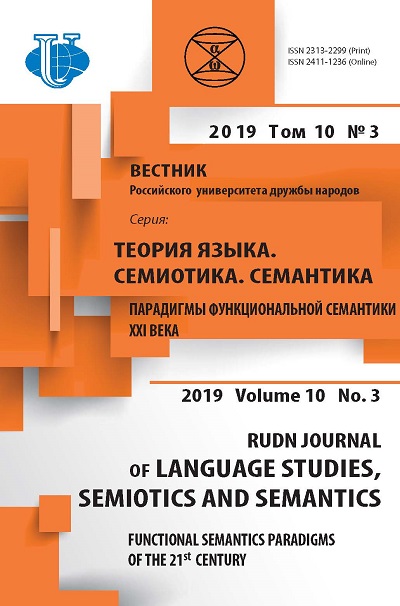Компонентный анализ как микросистема фундаментальных смыслов в произведении У.С. Моэма «THEATRE»
- Авторы: Козлова Л.Я.1
-
Учреждения:
- Военно-космическая академия им. А.Ф. Можайского
- Выпуск: Том 10, № 3 (2019): Парадигмы функциональной семантики XXI века
- Страницы: 687-699
- Раздел: КОНЦЕПТОСФЕРА И ЭСТЕТИЧЕСКАЯ ФУНКЦИЯ ДРАМАТУРГИЧЕСКОГО ТЕКСТА И ДИСКУРСА
- URL: https://journal-vniispk.ru/2313-2299/article/view/341137
- DOI: https://doi.org/10.22363/2313-2299-2019-10-3-687-699
- ID: 341137
Цитировать
Полный текст
Аннотация
Целью данного исследования было выявление фундаментальных смыслов в произведении «Theatre» выдающегося британского писателя и драматурга У.С. Моэма. В работе использован концептуальный анализ вербально-семантического и когнитивного уровня языковой (речевой) личности главной героини Джулии Ламберт, с привлечением компонентного анализа лексикографических источников. Компонентный анализ выявленной ЛСГ слов, репрезентирующих концепт «театр», продемонстрировал микросистему смыслов, имеющих в своем фундаменте два основных: LIE/ЛОЖЬ, относящийся к концептосфере театра - TRUTH/ПРАВДА, имеющий отношение к концептосфере реальности.
Об авторах
Лариса Яковлевна Козлова
Военно-космическая академия им. А.Ф. Можайского
Автор, ответственный за переписку.
Email: zyatkova64@mail.ru
кандидат филологических наук; доцент кафедры иностранных языков
Санкт-Петербург, РоссияСписок литературы
- Lakoff, D. & Johnson, M. (1980). Metaphors We Live By. Chicago.
- Conceptual metaphor URL: http://www.scodis.com/?q=ru/conceptual_metaphor (дата обращения: 08.04.2019).
- Chillton, P. & Lakoff, G. (2004). Foreign Policy by Metaphor. Language and Peace, Ch. Schaffner, A. Wenden (Eds.). L., N.Y. pp. 37—74.
- Turner, M. & Fauconnier, G. (2009). Conceptual Integration and Formal Expression, Metaphor and Symbolic Activity, 10 (3), 183—204.
- Baranov, A.N. (2010). Cognitive models in linguistic semantics In The Fourth international conference on cognitive science: Theses of reports: In 2 v. Tomsk, on June 22—26. Tomsk: Tomsk state university. Vol. 1.
- Budayev, A.V. & Chudinov, A.P. Cognitive theory of a metaphor: new horizons. URL: http://elar.urfu.ru/bitstream/10995/18228/1/01-110.pdf (accessed: 02.04.2019).
- Chudinov, A. (2001). Russia in a metaphorical mirror: cognitive research of a political metaphor. Yekaterinburg.
- Kiselyova, S.V. (2012). Sketches according to the cognitive theory of a conceptual metaphor In Scientists notes. Volume 19: Current Problems of Philology, Intercultural Communication and Translation. Saint Petersburg. pp. 33—42.
- Kozlova, L.Ya. (2016). Conceptual Metaphor in George Orwell’s Political Dystopia “Animal Farm” Network magazine “Research Result”, Questions of Theoretical and Applied Linguistics, 2-1(7), 23—30.
- Popova, W.L. & Sternin, I.A. (2007). Cognitive linguistics. Moscow: ACT, East-West.
- Skrebtsova, T.G. (2018). Cognitive linguistics: classical theories, new approaches, Moscow: YaSK publishing House. (Reasonable behavior and language. Language and Reasoning).
- Shishkina, S.A. (2015). Conceptualization of cognitive interest in the Russian and English languages: monograph. Tyumen: OST press.
- Askoldov, S.A. (1997). Concept and word. Russian literature. From the theory of literature to structure of the text. The anthology. Under the editorship of V.P. Neroznak. Moscow: Academia. pp. 267—279.
- Likhachyov, D.S. (1993). Sphere of Russian concepts. News of RAS. Literature and language series, 52 (1). pp. 3—9.
- Maslova, V.A. (2005). Cognitive linguistics. Minsk: Tetrasystems.
- Karaulov, Yu.N. (1989). Russian language personality and problems of its studying, Language and personality. Moscow. pp. 3—8.
- Klobukova, L.P. (1995). A phenomenon of the language personality in the light of Linguodidactics. Тhe International anniversary session devoted to the 100 anniversary of the academician Victor Vladimirovich Vinogradov: Theses of reports. Moscow. pp. 321—323.
- Solntsev, V.M. Language as a system and structural education. P. 11 URL: https://studme.org/ 81674/literatura/sistema_yazyka (accessed: 07.05.2019).
- Melnichuk, A.S. (1970). Concepts of a system and structure of language in the light of dialectic materialism//Leninism and theoretical problems of linguistics. M: P. 43. URL: https://studme.org/ 81674/literatura/sistema_yazyka (accessed: 07.05.2019).
- Gepner, Yu.R. (1959). Sketches on the general and Russian linguistics. Kharkiv. P. 52. URL: https://studme.org/81674/literatura/sistema_yazyka (accessed: 07.05.2019).
- Panov, M.V. Modern Russian. Phonetics. P. 6. URL: https://studme.org/81674/literatura/ sistema_yazyka (date of the address: 07.05.2019).
- Maugham, W.S. (2007) Theatre. Saint Petersburg: Corona Print, Caro.
- Arutyunova, N.D. (1990). Discourse In Linguistic encyclopedic dictionary. Moscow. pp. 136—137.
- Samarskaya, T.B. Literary discourse: Specifics of components and organization. URL: https://docplayer.ru/46587740-Hudozhestvennyy-diskurs-specifika-sostavlyayushchih-i-osobennosti-organizacii-hudozhestvennogo-teksta.html (accessed: 17.05.2019).
- Parshin, P.B. (1987). Linguistic methods in conceptual reconstruction. System researches. Moscow.
- Akhmanova, O.S. (1969). Bases of the component analysis. Moscow: Moscow publishing house.
- Macmillan English Dictionary for Advanced Learners. (2006). Bloomsbury Publishing Plc.
- URL: https://dictionary.cambridge.org/ru/ (accessed: 07.05.2019).
- Annette Bening, Sherry Turkle, Theatre by W. Somerset Maugham. In search of reality URL: https://rippleeffects.wordpress.com/2010/02/22/theatre-by-w-somerset-maugham-in-search-of-reality/ (accessed: 07.05.2019).
Дополнительные файлы








